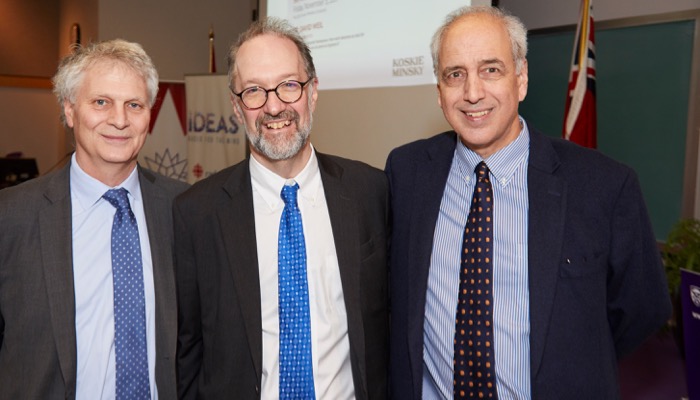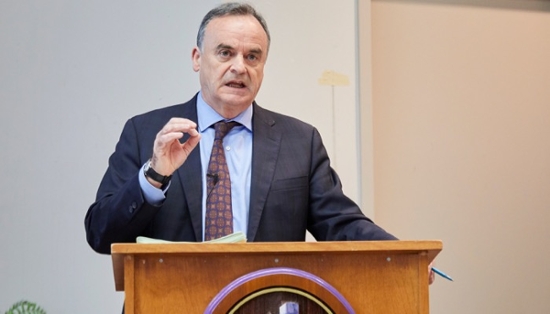The precarious workplace explored at Labour Law Lecture & Conference
November 14, 2017
Precarious work is a growing, and worrisome, phenomenon in North America, and is contributing to both deteriorating working conditions and rising income inequality. This was the theme of the most recent labour law lecture and conference series at Western Law, held on 3-4 November.
“The lecture and conference this year focused on the spread of temporary, causal and part-part work throughout the North American economy,” said Professor Michael Lynk, one of the organizers for the weekend event.

Craig Flood, Managing Partner at Koskie Minsky; Professor David Weil; Professor Michael Lynk
“Our speakers and panelists spoke to the rise on vulnerability among employees in the Canadian and American workplace, and why our law-makers should be addressing this trend. The consequences of insecure work go well beyond the workplace.”
Dr. David Weil delivered the Koskie Minsky University Lecture in Labour Law. Weil is the Dean of the Heller School for Social Policy and Management at Brandeis University in Boston, and author of The Fissured Workplace: Why Work Became Bad for So Many and What Can Be Done to Improve It (Harvard University Press, 2014).
In his lecture, Weil explained the term ‘fissured workplace’ as a geological metaphor: the growing cracks in the once rock-solid promise of stable and long-term employment. The social contract that glued capital, labour and government together in the post-war world is coming undone in the face of globalization and the mobility of capital, technology, legislative somnolence and the rise of the 1%.
Weil also added a personal flavor. During Barack Obama’s second presidential term, he served as the administrator of the Wage and Hour Division at the US Department of Labor. In this position, Weil oversaw the enforcement of employment standards in the American workplace, and developed a number of innovative approaches to improving working conditions.
One of the reminiscences he offered was his involvement in an unannounced inspection by the Labor Department of a garment factory in Los Angeles, which relied upon undocumented workers as part of its labour force.

Brian Burkett, Partner at Fasken Martineau
A total of 14 speakers addressed the attendees at the Fasken Martineau University Conference the following day. Hassan Yussuff, the President of the Canadian Labour Congress, representing 3.3 million workers, was the keynote speaker at the conference luncheon. He spoke about the urgency to improving employment standards in Canada, and the role of the labour movement in lobbying for better laws and a stronger voice for workers.
The conference presenters were a rich mix of economists, public policy specialists and lawyers. Prof. Wayne Lewchuk of McMaster University drew from his recent research on precarious work in the Greater Toronto Area to highlight how much of the recent productivity gains in the Ontario and Canadian economy have been captured by the upper income brackets.
Can improving the employment standards inspection regime help address the precarious work problem? Prof. Kevin Banks of Queen’s University argued that more, and better trained, inspectors can address the problem on non-compliance with current employment standards by a minority of employers. This can greatly assist vulnerable workers who have difficulty expressing their own voices when faced with legislative violations of employment standards.
The Conference ended on a high note with a closing banquet and an informative speech by the Ontario Minister of Labour, the Honourable Kevin Flynn. He spoke about Bill 148, the Government of Ontario’s legislative proposal to improve employment standards in response to the Changing Workplaces Review report in 2017, which addressed the challenges facing Ontario’s labour force and economy in a rapidly changing world.
“Our Lecture and Conference this year – the ninth such event we have hosted since 2003 with this partnership of leading labour law firms from both sides of the fence – was truly a great success,” said Prof. Lynk. “Labour law, after all, is about finding that balance between workplace productivity and workplace justice, and this event achieved that admirably.”
Listen to David Weil deliver the Labour Law Lecture (Courtesy of CBC Radio Ideas) http://www.cbc.ca/radio/ideas/the-disappearing-company-job-1.4433392






